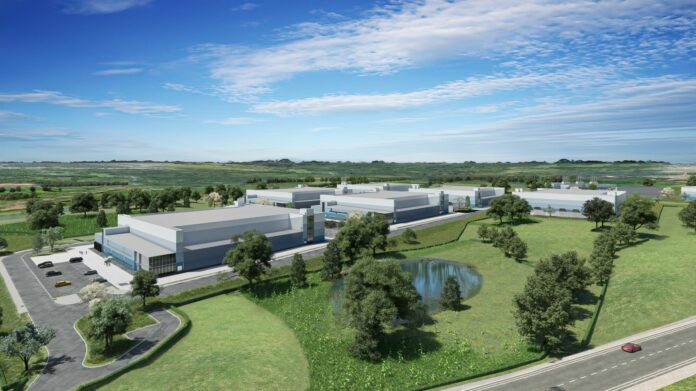FIFTEEN conditions were attached to the decision to grant planning permission to Art Data Centres, one of which is that it pays over €2 million to Clare County Council.
The chief executive’s order stated that prior to the commencement of the development, the developer/applicant “shall pay a contribution of €2,137,320 to Clare County Council in respect of public infrastructure and facilities benefiting development in the area of the Planning Authority”.
It added, “At the time of payment, the contribution will be subject to any applicable adjustment in accordance with the relevant provisions of the Planning Authority’s development contribution scheme in place at the time of payment.”
The planning permission is for a period of ten years from it being granted.
Another condition is that prior to commencement, the developer shall submit a schedule of mitigation measures, as identified in its Environmental Impact Assessment Report and Waste Management Plan, in a completed and phased Construction Environmental Management Plan and Waste Management Plan, to the Council for its agreement and approval.
A number of measures are required to protect local wildlife, as are measures regarding traffic and road safety.
The planner’s report on the new Ennis Data Centre noted that the development will provide an employment boost to the Ennis area, something the report said helped make the case for allowing it to proceed.
“In terms of the direct economic benefits arising from the proposed development, it is noted that 450-475 full time employees will be accommodated on site, representing a significant level of employment for the area, in addition to circa 40 full time and ten part time roles within the vertical farm, which forms an integral component of the proposed development.”
“Therefore, I would consider that the proposed development would make a significant contribution to strong economic activity and would accord with one of the agreed principles as contained in the Government policy in which there is a preference for data centre developments associated with strong economic activity and employment.
“Whilst the development has a relatively low employment capacity, its sub supply and spin off and the clustering of high value employment is of note in the assessment of this application.
“The proposed development is of a regional scale for the Mid-West and is at a location identified by Eirgrid to be an unconstrained area and as such complies with the latest government policy on Data Centres in terms of grid capacity and employment generation.
“On balance it is considered that the proposal is a significant positive regional development.”
Regarding the energy usage, the report says, “The site is to be provided with an 80MW+ connection to the existing Ennis Eirgrid substation and this is to be supplemented by gas powered generation in the energy centre to bring the total capacity to circa 200MW.
“By connecting to the Eirgrid network, there is an opportunity to use low carbon energy through on and off-shore wind generation and photovoltaic solar farms.
“Renewable sources of energy currently provide up to 40% of the total supply at any one time and this will increase significantly over the next decade as more and more renewable capacity is added to the network.”
It says that initially the provision of generation on-site will be based on natural gas, but that Gas Networks Ireland intend to move towards hydrogen in the coming years, while the engines on site will be future proofed, to enable them to run on hydrogen.
The report states that Ennis is favourably positioned to exploit the use of such renewable hydrogen energy given the proximity to the Shannon Estuary “and the potential for same to supply hydrogen power into the future”.
It adds that “To minimise air quality impact, it is noted that all of the gas engines are proposed to incorporate selective catalytic reduction fitted to their exhausts to reduce emissions to very low levels.
“Given the regional location of the site it is considered that there is capacity for the connection of the development to the grid.
“Furthermore it is noted that the proposal can facilitate district heating systems which have the potential to serve future development and zoned lands on the eastern part of Ennis.”
The report claimed that enough safeguards are in place to ensure it doesn’t have a detrimental impact on the national grid.
“In the time since the application was initially submitted, the Commission for Regulation of Utilities published its decision regarding the connection policy for data centres in Ireland.”
The planner noted that policy now requires a criteria-based assessment of grid connections, to ensure that overall system integrity is maintained and Eirgrid is also provided with a direct instruction to terminate a grid connection, in circumstances where an offer would be inconsistent with the needs of the electricity system.
“This is considered to provide adequate safeguards, to ensure that the proposed development (or any other data centre development) does not have any destabilising effect on the National Grid.”
It found that the visual impact of the development would not be overly negative.
“The development will present a notable addition to the landscape and will be visible from a number of short, medium and long range views, in particular from the Tulla Road West at Junction 13 off the M18.
“This impact is considered acceptable, given the locational context and the extensive landscaping proposals as provided by the applicant.”
The report concluded that the development would be in accordance with the proper planning and sustainable development of the area, and that planning be granted subject to conditions.
Owen Ryan has been a journalist with the Clare Champion since 2007, having previously worked with a number of other publications in Limerick, Cork and Galway. His first book will be published in December 2024.


